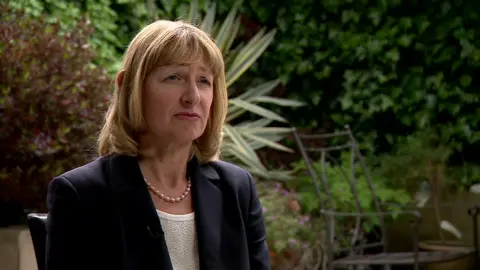Charities funding plea for Covid-19 bereavement support
 BBC
BBCBereavement support charities are calling for more funding in light of what they call the "terrible toll of 100,000 deaths from Covid-19".
They say many families have been unable to be with loved ones as they died or gather to support one another.
They argue there has been "huge demand" for counselling and guidance but some providers lack sufficient resources.
The government says it is committed to ensuring those who are grieving have access to the support they need.
In a letter to the Health Secretary Matt Hancock, and mental health minister, Nadine Dorries, charities call for some of the £500 million funding allocated to mental health in England in the November spending review to be used to support the bereaved.
'Limited contact'
The request has come from the National Bereavement Alliance, which represents a range of charities. Members include CRUSE Bereavement Care, Support after Suicide Partnership and AtALoss.
Both national and local support providers are involved.
The letter quotes academic research suggesting more than 80% of bereaved people since the start of the pandemic have had limited contact with family and friends and two-thirds have experienced social isolation or loneliness.
They say there are long waiting lists for support but some services providing advice and guidance are not adequately funded.
The alliance argues deaths have been heavily felt in disadvantaged and deprived communities where there is a greater need for assistance.
Lucy Coote is community ambassador for Rosedale Funeral Home, which offers bereavement support services locally in Norfolk and Suffolk and for others nationally who might need help.
She also organises online support groups, one-to-one counselling and training in bereavement support for professionals such as doctors and teachers who she says can be "woefully underprepared".
"A lot of people have had their grieving complicated by the pandemic because they have not had loved ones around them," Lucy says.
Every funeral since the start of lockdown restrictions in March has been affected in some way by Covid, she adds.
She argues the bereaved need guidance to find the most appropriate sources of help.
"People have to navigate through their grief," she says.
That's where "signposting" comes in - one stop shop services which can direct people to agencies most relevant to their needs.
One of them is AtaLoss, a website founded by Yvonne Richmond Tulloch.
She was suddenly widowed in 2008 and in her own words, her "life went into freefall" because it was hard to find the right sort of assistance.
She said: "Finding timely support has yet to be recognised as a key factor in preventing future problems. We have become relied upon over the past few months in providing a vital central place for bereaved people to find the help they need".
'Critical provision'
The National Bereavement Alliance carried out a survey which it says found that 40% of voluntary sector bereavement managers will have to close or further reduce services if they do not secure future funding.
The alliance argues financial support was requested ahead of the autumn spending review but this was rejected. The letter to ministers calls on them to "look again at how this critical provision can be supported".
In a statement, Nadine Dorries, said: "The government has put in place restrictions over the last year to control the virus.
"This has sadly restricted the ability of the bereaved to access many aspects of healthy grieving and I do not underestimate how difficult this has been.
"I am committed to ensuring those who are grieving have access to the support they need throughout the pandemic and beyond. This is why we have given over £10.2m to charities, including bereavement charities, since March."
